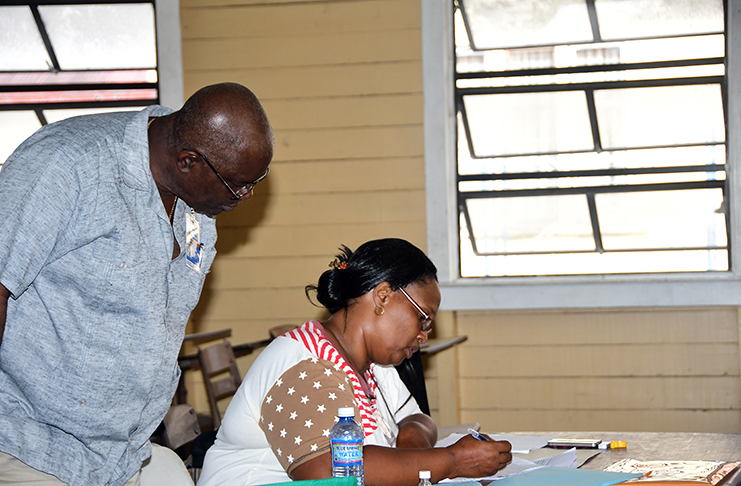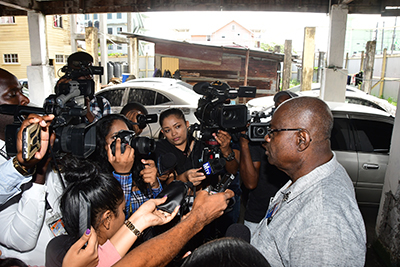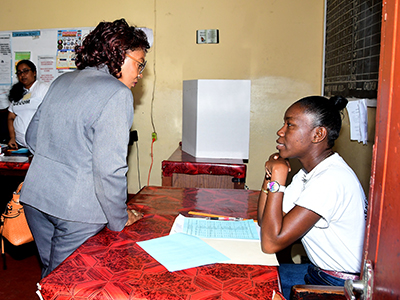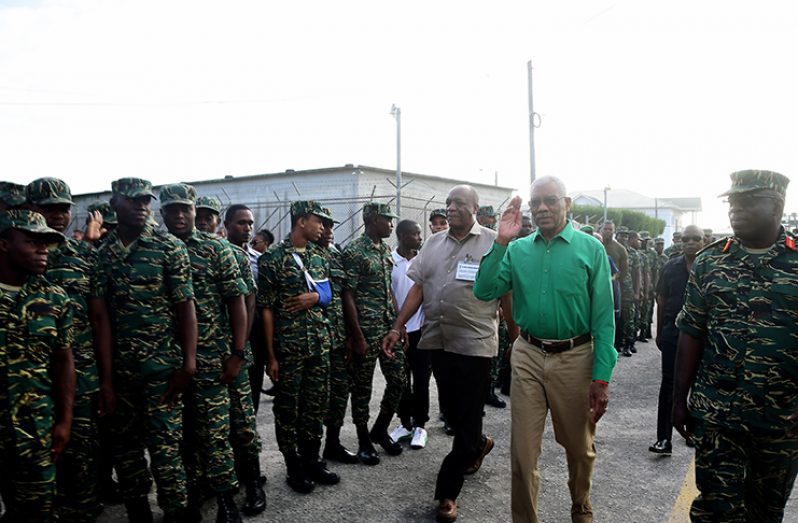…GECOM defends decision to reduce private residences as polling stations
…President points to allege abuse in the past
…PPP up in arms against decision that was recommended by Carter Center
CHAIRMAN of the Guyana Elections Commission (GECOM), Justice (Ret’d) Claudette Singh, said the decision to reduce the number of private residences as polling places is in keeping with recommendations from the Carter Center, shutting down allegations of voter suppression by the opposition.

Justice Singh also made it clear that while the number of private residences has been reduced, the use of public buildings has increased. “Those [private residences] have been reduced because they are using public buildings. It is not that the polling stations are removed from the area, it is just the private residences; they are moving away from those,” Justice Singh explained to journalists on Friday. At the time, the GECOM Chair was observing voting by ranks of the Guyana Police Force at the Brickdam Police Station. Days after the May, 2015 General and Regional Elections, the Carter Center, in an Elections Observer Mission Report, urged GECOM to make a deliberate effort to reduce the number of private residences being used as polling places.
Despite this recommendation, the People’s Progressive Party Civic (PPP/C) is up in arms against GECOM’s decision to reduce the number of private residences as polling places for the March 2 General and Regional Elections, noting that the reduction had taken place in its stronghold.
GECOM RESPONSIBLE
Weighing in on the issue, President David Granger said the elections

commission is responsible for the identification of polling places and polling stations. He said, in the past, the use of private residences had proven to be a challenge. “Some of them were obscure, some of them were the houses of active political advocates and many persons, not associated with the administration at that time were disenfranchised. I am very confident that it will not happen now. I am confident that the elections commission, which is in charge of elections, will make the right decision,” the Head of State told reporters.
PPP UPSET
“We consider this latest development as yet another attempt by GECOM to frustrate voters, suppress and hinder voting and create possible confusion on Elections Day,” the PPP/C said in a late-night statement on Thursday. While acknowledging that the number of polling stations has increased from 2,299 in 2015 to 2,339 in 2020, PPP/C contended that the increase was not sufficient to accommodate the increase of almost 90,000 electors in 2020. It alleged that the situation is further compounded by the reduction of private-residence polling places.

“In areas such as: -1) Mon Repos, East Coast Demerara, with almost 7,000 electorates, GECOM has reduced the number of polling places from 10 to two, eliminating completely all private residences, while cramping all the polling stations into two schools situated at the same location – this will definitely result in confusion, frustration and will keep voters in lines for several hours,” the PPP/C contended.
Its Presidential Candidate, Irfaan Ali, and Executive Secretary, Zulfikar Mustapha, made similar allegations on Friday, as they too observed the electoral process. In Chesney Village, Region Six, Ali contended that eligible voters would be required to walk approximately two miles to access a polling place. “The system must be built in such a way that makes it easy for the electorate to exercise their franchise, that is part of having the democratic will exercise,” the PPP/C Presidential Candidate said.
FARFETCHED
But Justice Singh said the PPP/C’s contentions are farfetched. The GECOM Chair also rejected claims of voters’ suppression, while reiterating that the reduction in the use of private residences as polling stations is in keeping with the Carter Center’s recommendation. “I am not aware of that, I am not aware of that at all. I am aware that they are using the public buildings,” she iterated while responding to claims of voters’ suppression.
Responding to a series of questions posed by journalists on Friday, the Chief Elections Officer (CEO), Keith Lowenfield, detailed that 2,339 polling stations would be in place for General and Regional Elections. Of that number, approximately 92 are housed in private residences, and according to him, the elections commission had little or no other choice than to use the private residences. “The circumstances have dictated, there are absolutely no public building, public or other building that could have been used in these instances, and therefore we had no choice. The residents of those particular divisions, sub-division have to vote,” he said.
The CEO said in some cases, electors would be required to use various medium of transportation to access polling places. Using Mon Repos as an example, he said the East Coast Demerara village has a total of 18 polling stations. He made it clear that once public buildings are available, they will be used as polling stations. “Generally, public places are used for elections, and if public places are available, then public places will be used. It is simple as that. There is no magic in this,” the CEO made clear.
In May 2015, following the close of polls, civil unrest flared up in ‘C’ Field, Sophia with the burning of vehicles outside the home of Pastor Narine Khublall – a staunch PPP/C supporter – when reports were spread that he was storing ballot boxes on his premises.
The Guyana Police Force (GPF), Guyana Defence Force (GDF) and the Guyana Fire Service (GFS) were called to the scene to calm the high emotions of electors who felt that their democratic right was being violated. It is hoped that the increase use of public buildings would prevent such recurrence.




.jpg)









